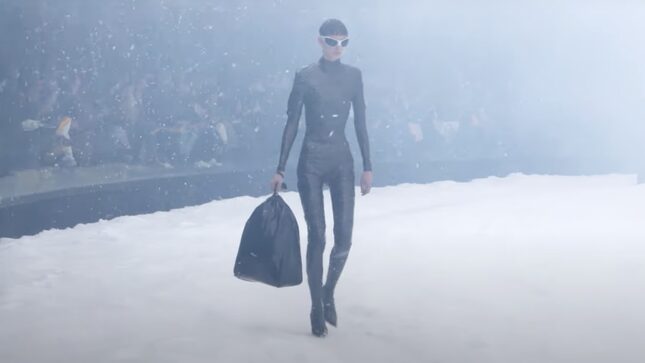The Discomfort of Fashion Brands Commenting on Ukraine
Balenciaga's Paris Fashion Week show offered a stormy presentation that essentially said, "Make clothes, not war."
BeautyStyle

Fashion’s place during wartime is about as hotly contested as the debate is morally unnerving. Should brands use their platforms for artistic commentary on major issues or should they stay in their lane, quietly shuffling haute couture-adorned models down runways? It’s a question that grates designers and consumers alike: A brand’s warped expression of corporate empathy during a time of need sometimes feels emptier than silence. Although we’ve repeatedly asked high fashion labels to stop making half-hearted activist statements that cause more ire than awareness, many still feel the need to comment when they could say nothing at all.
Last week, during an uncomfortably timed Paris Fashion Week, Balenciaga attempted to tackle this conundrum as it presented its striking fall 2022 show. From within a constructed snow globe, complete with shivering models lugging trash bags, the show offered looks through a contrived snow storm rife with flashes of light. Balenciaga’s creative director Demna’s apparent goal was to dedicate the show to displaced Ukrainians. Those shivering models? Assumed Ukrainian refugees fleeing with their belongings in tow. The flashes of light? Perhaps an ode to bombs streaking the sky as civilians took cover with their families in bomb shelters.
Demna had reportedly entertained the idea of canceling the show altogether, which was initially set to be a commentary on climate change, according to the New York Times. Instead, the former refugee of Georgia said he “realized canceling this show would mean giving in,” so he had t-shirts made with the colors of the Ukrainian flag draped on every seat in the house, along with a note that explained that the global crisis raging on the other side of the world had “triggered the pain of a past trauma I have carried in me since 1993, when the same thing happened in my country and I became a forever refugee.” A poem was also read in Ukrainian at the beginning of the show.
Both the show and designer have received praise for grappling with an impossible situation. Everywhere from Diet Prada to the Times offered verbal applause for the show, with the latter going as far as to call Demna “the greatest scenographer in fashion, and its most fearless.” Like celebrities—arbiters of some of the most cringe-inducing social commentary memorialized on the internet—fashion brands often find themselves in a vat of quicksand when geopolitical events take place: They’re damned if they don’t comment and damned if they do, even more so when they get the message ass-backwards. Of course, driving awareness for a humanitarian crisis and to funds that support that crisis are good. Forcing fashion consumers not to disassociate while they nestle in for a show of glitz and contemporary glamor is good. But the hypocrisy inherent in the industry is just too much to forgive so quickly.
While a stunning display of solidarity at the highest level of artistry and craftsmanship, the Balenciaga show still encouraged the act of othering—suggesting that attendees gaze inside the brand’s magical snow globe with its swirling tundra and reflect back upon their own less-than-humble circumstances with disdain and guilt. There is no real call to action, just a call to observe the isolating feeling of “us” and “them.”
That’s not to say that the show—or the fashion industry at large—are useless when current events inevitably bleed onto the runway. Model Gigi Hadid acknowledged that the show often must go on during “heartbreaking and traumatic times,” then pledged to donate her earnings from the Fall 2022 runway shows to those suffering in Ukraine, along with the ongoing Israeli-Palestinian conflict. Balenciaga, for its part, has also directed its Instagram traffic to websites and funds where loyalists can donate to support refugees.
But the fact that Kim Kardashian’s Balenciaga-branded bondage (and questions of how she might pee in it) garnered far more coverage than the brand’s mission-based show further proves that consumers aren’t necessarily demanding this level of activism from fashion.
Balenciaga made a dent in an industry that often seeks to remain silent, and it’s not so much that the message is wrong. It’s that it doesn’t sit all the way right. High fashion will have to continue working through its hypocrisies, however slowly, out in the open where we can all see—even when we don’t want to.